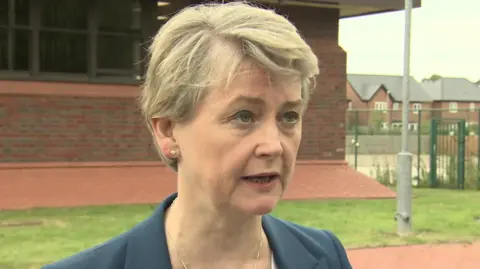The statement by Yvette Cooper, the Home Secretary of the UK, has stirred considerable attention concerning Palestine Action, a group recently banned under terrorism legislation. Cooper articulated that many supporters of Palestine Action may not fully understand the nature of the organization, especially following a weekend marked by mass arrests. Specifically, over 500 individuals were arrested during protests related to Palestine Action. These events have raised glaring questions surrounding civil liberties, protest rights, and the government’s stance on organizations it deems dangerous.
First, it’s essential to recognize that Cooper’s comments emphasize her belief that Palestine Action does not engage in non-violent activities. She has stressed that while many people protested lawfully about the crisis in Gaza, the involvement of Palestine Action complicates the scenario, leading to its classification as a terrorist organization. This claim has significant implications; it suggests that the government views some advocacy groups as capable of posing a risk to national security, warranting their proscription.
The issues surrounding the mass arrests of the protesters have not gone unnoticed. Many observers view the government’s reaction as excessive and indicative of systematic suppression of dissenting voices. Amnesty International, a prominent human rights charity, described these arrests as “deeply concerning.” This concern hinges on the fact that blanket bans like the one imposed on Palestine Action could deter legitimate protests and dilute the rights of citizens to express their views on international crises.
In addition to her assertion regarding the nature of Palestine Action, Yvette Cooper pointed out the severe consequences of the group’s actions, which allegedly included significant damage to military aircraft at RAF Brize Norton, estimated to have cost around £7 million. This factor likely played a pivotal role in the government’s decision to apply terrorism legislation against the group. Notably, Cooper expressed confidence in the decision to ban the group, noting that their acts had violated national security and inflicted major damage.
The mass protests that culminated in the arrests were organized by Palestine Action sympathizers who reportedly coordinated efforts to express their discontent simultaneously across multiple locations, including Parliament. Such protests raise complex legal and ethical questions about the right to assembly, particularly when a government places restrictions on specific organizations. Cooper suggested that some individuals might not have all the facts about Palestine Action, implying that court restrictions on reporting may obscure public understanding of the group’s operations.
Amnesty International’s Chief Executive, Sacha Deshmukh, challenged Cooper’s narrative, labeling the governmental response to the protests as disproportionate. He highlighted longstanding critiques regarding the broad and vague language of UK terrorism laws, underscoring how they might infringe upon freedom of expression. Concerns about overreach in law enforcement are particularly salient when assessing the balance between national security and civil liberties.
As discussions unfold regarding the government’s decision, a spokesperson for the Prime Minister reinforced that the bans and subsequent actions taken against Palestine Action were based on robust security assessments. However, details about the specific terrorism acts identified by the Joint Terrorism Analysis Centre remain undisclosed to the public. This veil of secrecy can potentially undermine citizen trust in the government’s intentions and actions.
In the midst of this, Sir Keir Starmer, the Prime Minister, has also taken a substantial position regarding the broader Israeli-Palestinian conflict. He has warned that the UK would recognize a Palestinian state unless Israel takes meaningful steps to address the humanitarian situation in Gaza. This statement has received backlash from Israeli officials, who argue that such a move rewards terrorism.
Lastly, the ongoing humanitarian crisis in Gaza, fueled by military actions and strict blockades, has resulted in staggering loss of life and suffering. The data indicates that approximately 61,430 individuals have died in Gaza due to Israeli military operations since October 7, 2023, illustrating the urgency of international diplomatic efforts. Leading organizations and humanitarian agencies warn that the flow of aid to Gaza is critically insufficient, raising alarms about widespread famine conditions.
Overall, the current political climate surrounding Palestine Action and the Israeli-Palestinian conflict requires careful navigation to protect civil liberties while addressing genuine security concerns and the dire humanitarian needs of those affected by violence and unrest.











